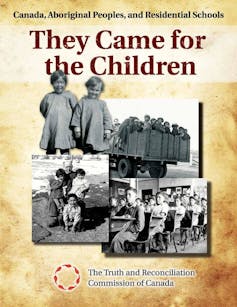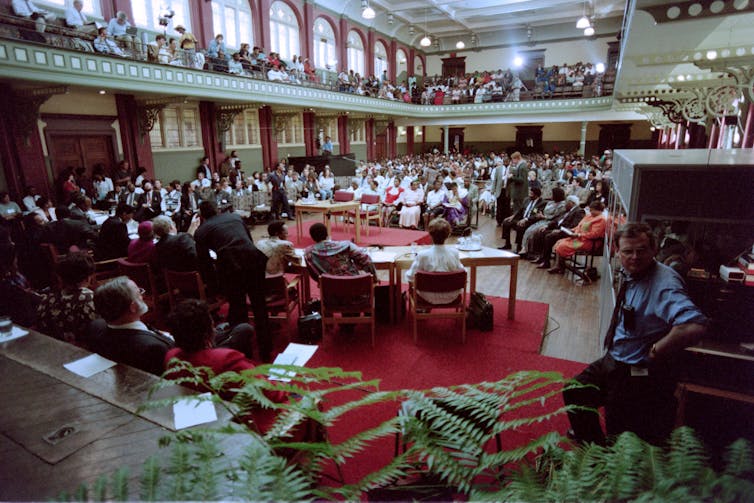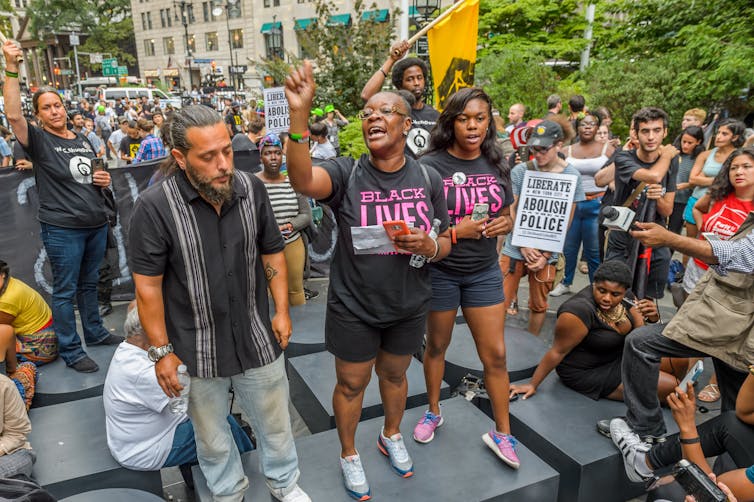To fight US racism, research prescribes a nationwide healing process
- Written by Benjamin Appel, Associate Professor of International Relations, Michigan State University
As the U.S. prepares to celebrate another year of its independence, the country is paying renewed attention to the founders, and how their legacy of slavery is linked to systemic racism.
Calls for reform to policing across the nation can help to directly reduce police violence against civilians but don’t address the centuries-old underlying problems in American society. Our research indicates that the country is not likely to escape its historic cycles of violence and racial oppression without addressing this painful and troubled history.
Sparked by the killing of George Floyd at the hands of the Minneapolis police, protests have emerged across the United States demanding police and criminal justice reform. Reform efforts abound – including Minneapolis city councilors declaring they will dismantle the police department[1], school districts cutting ties with local police[2] and states banning the police use of chokeholds[3].
Those efforts can make meaningful differences in individuals’ lives, but they do not address the systemic injustices perpetrated throughout the nation’s history. Our[4] research[5] into how war-torn and fractured nations find peace, justice and societal reconciliation[6] offers one possible approach. Truth commissions and reparations programs can effectively involve all perspectives in a conflict in a national-level discussion about longstanding political and economic grievances. In other countries, those efforts have led to sustainable and lasting peace[7] in divided societies.
How do truth commissions work?
 A book published by the Truth and Reconciliation Commission of Canada details the abusive treatment of Indigenous people in residential schools.
Truth and Reconciliation Commission of Canada/Wikimedia Commons[8]
A book published by the Truth and Reconciliation Commission of Canada details the abusive treatment of Indigenous people in residential schools.
Truth and Reconciliation Commission of Canada/Wikimedia Commons[8]
Truth commissions are investigations into past wrongdoings by a group of authorities, such as community or church leaders, historians or human rights experts. There is great variation in how truth commissions are designed, but their missions are the same. These investigations include the voices of those who experienced the wrongdoings as well as those alleged to have done harm.
Typically, truth commissions create a forum where wrongs can be disclosed, examined and confronted through education, prosecution, compensation or other forms of redress.
Perhaps the most recognized example was South Africa’s Truth and Reconciliation Commission[9], established in 1995 at the end of apartheid. The commission collected personal statements from 21,000 victims of gross human rights violations at the hands of South Africa’s government and police. Much of this testimony was broadcast on national television. The commission later compiled and published a seven-volume report into the abuses suffered under apartheid, which included recommending reparation payments to victims and prosecutions for those denied amnesty.
Other countries have had similar processes aimed at righting wrongs. For instance, a Canadian truth commission[10] documented the legacy of physical and sexual abuse inflicted on thousands of Indigenous Canadians in a program of forced assimilation and education. The findings led to a formal government apology[11], saying “Today, we recognize that this policy of assimilation was wrong, has caused great harm, and has no place in our country.” Its work also sparked reforms to the national education curriculum[12].
Truth commissions promote reconciliation when they help victims heal[13] from the wounds of the past by publicly acknowledging those wrongs. Commissions also educate other members of society about the suffering incurred by victims through the publication of summary reports[14], public dissemination of findings[15] and education campaigns[16].
In the wake of Floyd’s death and the resulting protests, California Rep. Barbara Lee, a Democrat, has introduced legislation calling for the establishment of a national Truth, Racial Healing, and Transformation Commission to “fully acknowledge and understand how our history of inequality continues today[17].”
In recent years, others have suggested similar efforts to address anti-Semitism, racism and other social injustices[18].
 The opening session of South Africa’s Truth and Reconciliation Commission was held April 15, 1996.
Philip Littleton/AFP via Getty Images[19]
The opening session of South Africa’s Truth and Reconciliation Commission was held April 15, 1996.
Philip Littleton/AFP via Getty Images[19]
When are truth commissions effective?
Our work provides specific guidance about making these processes most effective.
First, they must include all parties to the dispute.
In a U.S. discussion of racial injustice, that means white and Black Americans must participate together. The commission’s hearings would be an important opportunity for Black Americans to heal through discussing their shared experiences.
But it is at least as important, or possibly more so, for white Americans to hear this information, which is likely to be unfamiliar to many of them – and acknowledge the long-term effects of slavery and systemic racism in U.S. society.
In South Africa, for instance, research found that the commission was most effective at changing the racial attitudes of white South Africans[20] by teaching them about the abuses Black South Africans suffered. This facilitated reconciliation because once the truth was shared, people could apportion blame and responsibility.
Second, our research suggests that national-level processes are an important component of durable peace, as measured by the lack of a return to violence[21] following civil conflict. Structural injustice is a nationwide problem in the U.S. Larger social change therefore requires an approach at the national scale.
Those processes can often lead to wider public understanding of how and why reparations, financial compensation payments to victims of wrongdoings, can be a vital part of national healing. These programs directly address the material and personal losses inflicted on the victims of prejudice and injustice. Some notable leaders like author Ta-Nehisi Coates[22] and media magnate and BET founder Robert Johnson[23] have made the case for financial payments to Black Americans. That is one way to approach the wrongdoings.
 Demonstrators in New York City asked city leaders for reparations for all survivors and victims of police brutality.
Erik McGregor/Pacific Press/LightRocket via Getty Images[24]
Demonstrators in New York City asked city leaders for reparations for all survivors and victims of police brutality.
Erik McGregor/Pacific Press/LightRocket via Getty Images[24]
Our work, however, finds that community reparations, such as funding for community development programs like public spaces and hospitals and educational scholarships, can also be effective when they are adopted as part of an effort that reveals truth and acknowledges grievances. Reparations can bring about social healing because they send a strong signal to the population that the government is committed to addressing historical wrongs.
But a word of caution is also in order. Our work has found that reconciliation efforts can be susceptible to political manipulation[25] and hijacking[26]. Truth commissions and reparations can fail to bring about reconciliation[27] when they do not incorporate diverse perspectives and experiences. Overcoming these challenges requires a national process with widespread participation across communities as well as strong community organizations[28] and a free press[29] to monitor its progress.
The killing of George Floyd has once again revealed the racism and racial oppression that continue to plague America. The protesters and their broad-based group of supporters[30] also make clear that many in the country are ready for leaders to finally adopt a fundamentally new approach to racial equality[31].
It may be tempting for people to work locally to address these injustices, and those efforts can indeed make changes. But our research shows that a national solution would be the best way to heal from America’s “original sin[32]” of slavery and longstanding institutional racism, and achieve lasting peace and justice.
[Deep knowledge, daily. Sign up for The Conversation’s newsletter[33].]
References
- ^ dismantle the police department (www.nytimes.com)
- ^ school districts cutting ties with local police (www.yahoo.com)
- ^ states banning the police use of chokeholds (www.cnn.com)
- ^ Our (scholar.google.com)
- ^ research (www.cyanneloyle.com)
- ^ find peace, justice and societal reconciliation (doi.org)
- ^ sustainable and lasting peace (doi.org)
- ^ Truth and Reconciliation Commission of Canada/Wikimedia Commons (en.wikipedia.org)
- ^ South Africa’s Truth and Reconciliation Commission (www.justice.gov.za)
- ^ Canadian truth commission (www.trc.ca)
- ^ formal government apology (www.cbc.ca)
- ^ reforms to the national education curriculum (www.cbc.ca)
- ^ help victims heal (www.tandfonline.com)
- ^ summary reports (www.desaparecidos.org)
- ^ public dissemination of findings (www.wilsoncenter.org)
- ^ education campaigns (www.sierraleonetrc.org)
- ^ fully acknowledge and understand how our history of inequality continues today (lee.house.gov)
- ^ anti-Semitism, racism and other social injustices (theconversation.com)
- ^ Philip Littleton/AFP via Getty Images (www.gettyimages.com)
- ^ changing the racial attitudes of white South Africans (www.russellsage.org)
- ^ lack of a return to violence (doi.org)
- ^ author Ta-Nehisi Coates (www.theatlantic.com)
- ^ media magnate and BET founder Robert Johnson (www.nbcnews.com)
- ^ Erik McGregor/Pacific Press/LightRocket via Getty Images (www.gettyimages.com)
- ^ political manipulation (doi.org)
- ^ hijacking (www.cornellpress.cornell.edu)
- ^ fail to bring about reconciliation (www.tandfonline.com)
- ^ strong community organizations (doi.org)
- ^ free press (doi.org)
- ^ their broad-based group of supporters (www.pewtrusts.org)
- ^ fundamentally new approach to racial equality (www.nytimes.com)
- ^ original sin (www.foreignaffairs.com)
- ^ Sign up for The Conversation’s newsletter (theconversation.com)
Authors: Benjamin Appel, Associate Professor of International Relations, Michigan State University

